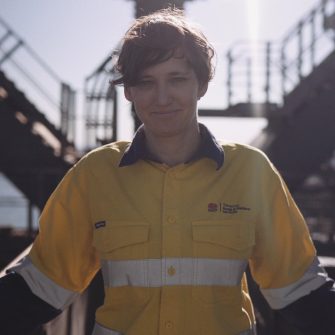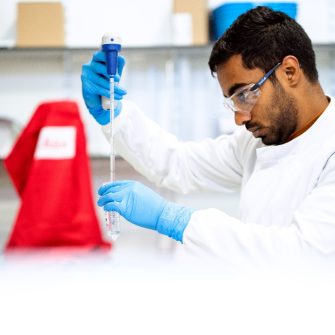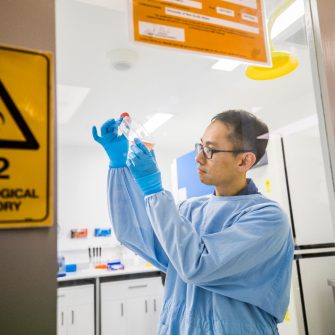Master of Engineering (Mining)
- Commencing Terms
- Term 1, 2 & 3
- Duration
- 2 Year(s)
- Delivery Mode
- Face-to-face (includes blended)
- Campus
-
Kensington
- Codes
- Program code 8621
-
2025 Indicative first year full fee
- $44,000*
-
2025 Indicative full fee to complete degree
- $90,000*
-
2025 Indicative first year full fee
- $58,000*
-
2025 Indicative full fee to complete degree
- $121,000*


UNSW is introducing a new academic calendar from 2028.
What does this mean for my studies? UNSW is moving to a new ‘flex-semester’ calendar.
- Overview
- Entry requirements
- What will I study?
- Future careers
- How to apply
- Fees & Scholarships
Overview
UNSW Master of Engineering (Mining) is a two-year full-time postgraduate degree taught at Australia’s top engineering faculty. Upon graduation you’ll have the engineering accreditation to help you get ahead in your career. The flexible degree offers in-depth knowledge and technical ability in your specialisation of mining while contributing to your ongoing professional development. You’ll develop your skills in engineering management, analysis and design that you’ll apply through practical experience in industrial training.
This degree is designed for students with an undergraduate degree wanting to pursue a career in the Engineering profession with an accreditation by Engineers Australia.* You’ll graduate with a qualification that is internationally recognised by the Washington Accord and is globally recognised to facilitate the mobility of engineers.
Through this degree, you’ll gain the theory, tools and strategies required of today’s Mining Engineers and gain advanced knowledge in:
- Project management
- Mining engineering and mine design
- Geotechnical engineering
- Mine geomechanics
- Environmental management
- Mineral processing
- Mine ventilation and water
- Hazard identification, risk and safety management
- Waste management
The Master of Engineering includes an integrated 60 days industrial training component and courses to develop your technical knowledge and skills in engineering management, analysis and design to ensure you graduate career-ready and accredited.
You’ll have the opportunity to undertake an extensive research project to extend your knowledge in a specific area of interest. The project enables students to gain valuable skills in project planning and management and learn methods to undertake the critical analysis, interpretation and communication of results.
*The Master of Engineering (Mining Engineering) is provisionally accredited by Engineers Australia.
Why study at UNSW?
Studying Mining at UNSW means you’ll graduate with a degree from one of the most well regarded institutions in the world. UNSW’s School of Minerals and Energy Resources Engineering is ranked #1 in Australia and #2 globally for Mineral and Mining Engineering (QS World University Rankings by Subject, 2025). The school has been leading the innovation of world-class education and research of petroleum and mining for more than 70 years.
We're also ranked #1 in Australia and #25 globally for Engineering and Technology. As well as this, all of UNSW's Engineering schools are ranked in the global top 50 with two schools ranked in the global top 10 for Engineering subjects (QS World University Rankings by Subject, 2025).
UNSW is known for its graduate employability, with UNSW awarded the Most Employable students for six years in a row (Australian Financial Review (AFR) Top100 Future Leaders Awards, 2020-2025).
We produce internationally acclaimed research, working closely with industry to provide innovative solutions. At UNSW, we focus on the long-term health of the sector through research in Sustainable Mining Practices. This research feeds directly into our degrees to maintain the Australian mining industry’s comparative advantage of cost-competitive, safe and environmentally responsible operations.
Studying with us you'll have access to world-class facilities and opportunities in mining, including:
- UNSW's floor-to-ceiling 360-degree virtual reality simulator, offering realistic underground mine scenarios for training in potential hazards, evacuation procedures and feasibility studies
- UNSW technological innovations such as the Tyree X-Ray CT imaging facility and ViMINE mine planning tool
- More postgraduate specialisations and engineering opportunities than any other Australian university. Allowing you to develop career paths in multiple industries
- Close links and networking opportunities with key industrial, commercial and professional organisations
Want to see more from UNSW Engineering?
Entry requirements
Admission to this program requires one of the following:
- 4-year Bachelor of Engineering degree (or equivalent) in a cognate discipline that is not completed in Australia;
or
- 3-year Bachelor of Engineering Science degree in a cognate discipline.
A minimum 65% average, or its equivalent, throughout the qualifying bachelor’s degree is mandatory.
Admission pathways
UNSW Global has university pathway programs that provide seamless transition to UNSW Sydney so you can achieve your academic and career goals. Learn more.
English language requirements
You may be asked to provide evidence of your English proficiency to study at UNSW depending on your educational background and citizenship. English language skills are vitally important for coping with lectures, tutorials, assignments and examinations - this is why UNSW requires a minimum English language competency for enrolment.
If you’re completing an Australian Year 12 qualification (e.g. NSW HSC or equivalent), you do not need to provide anything extra to prove your proficiency. Your qualification will be used as evidence of your English proficiency.
If you do need to provide evidence of your English proficiency, this will be indicated in your application. You can prove this by providing evidence that you meet one or more of the following criteria:
- English language tests and university English courses
- Prior study in the medium of English
- Other qualifications
If you need to improve your English skills before you start your degree, UNSW College’s Academic English Programs are for you. The programs are suitable for various English levels and help you prepare for university studies and life in Australia.
For more details, visit the English Language Requirements page.
Admission to this program requires one of the following:
4-year non-accredited (under the Washington Accord) Bachelor of Engineering degree (or equivalent) in a cognate discipline with a minimum 65% average; or
3-year Bachelor of Engineering Science degree in a cognate discipline, at least equivalent to the first three years of an Engineering degree accredited under the Washington Accord with a minimum 75% average.
A pathway for entry into the program for graduates from both 4-year Bachelor of Engineering degrees in non-cognate disciplines, and 3-year Bachelor of Science degrees, exists via enrolment first into the Bachelor of Engineering (BE) program, where advanced standing (to a maximum of 2 years) may be granted.
English language requirements
You may be asked to provide evidence of your English proficiency to study at UNSW depending on whether you are from an English-speaking background or non-English speaking background. English language skills are vitally important for coping with lectures, tutorials, assignments and examinations - this is why UNSW requires a minimum English language competency for enrolment.
If English is not your first language, you’ll need to provide proof of your English proficiency before you can be given an offer to study at UNSW. You can do this by providing evidence that you meet one or more of the following criteria:
- English language tests and university English courses
- Prior study in the medium of English
- Other qualifications
If you need to improve your English skills before you start your degree, UNSW College’s Academic English Programs are for you. The programs are suitable for various English levels and help you prepare for university studies and life in Australia.
For more details, visit the English Language Requirements page.
Check the specific English language requirements for this program
What will I study?
Program structure
The Master of Engineering is a two-year degree, which can be studied part time or full time. In this degree you’ll gain a solid background in an area of your choice.
The structure of this degree provides the opportunity for students to specialise in an area of interest while gaining a depth of knowledge across a broad range of topics. This degree serves as an entry point to move into the Engineering Profession.
With a strong component of industrial, on-the-job training, our program structure includes:
60 days of industrial training
Six disciplinary knowledge courses
Five advanced disciplinary knowledge courses
Two engineering and technical knowledge courses
One design course
A research project
Full program structure
Degree structures can vary depending on your specialisation of choice, the number of courses you choose and timetabling, to give you an indication you can consider the below.
In your first year you'll study :
Disciplinary Knowledge courses, these are introductory courses where you’ll learn the fundamentals of your chosen specialisation
You may also start studying some of your Advanced Disciplinary Knowledge courses where you’ll be able to tailor your degree to your interest by selecting courses which align with your career goals.
In the second year, you’ll complete the remaining Disciplinary and Advanced Disciplinary Knowledge courses, and study:
Engineering and Technical Management courses which help you build skills in project and or staff management, leadership and strategy.
A design course which is specific to your chosen specialisation – in this course you will be assigned a design task relevant on an area of your studies.
At the end of your degree you’ll bring together all the Engineering principles you’ve learnt to solve complex, open ended problems such as the development of a specific design, process and/or the investigation of a hypothesis.
This degree requires you to complete 60 days of Industrial Training, which gives you some on the job experience before graduating, enabling you to develop the essential technical and professional skills, so you thrive in your future career.
Future careers
The mining industry is worth hundreds of billions of dollars globally. Mining Engineers enjoy successful careers in Australia and overseas. Upon graduation, you can work in technical roles such as Drilling or Mine Planning Engineer, consulting, project management, research and development or with regulatory agencies.
As new forms of energy are being discovered and more widely used, many other resource sectors require Mining Engineers. Mineral resources are crucial in powering key elements of the renewable and sustainable energy industry, including lithium batteries, solar panels and wind turbines.
While the mining industry is mature, new technologies are breathing in new life. Technologies that revolutionise mining operations such as automation, robotics and artificial intelligence are becoming more commonplace and are creating exciting career opportunities for Mining Engineers.
Our graduates have gained employment with some of the world’s and Australia’s largest companies in the industry, including:
- AECOM
- Arcadis
- BHP
- Glencore
- Newcrest Mining
- Rio Tinto
Accreditation
The Master of Engineering (Mining Engineering) is provisionally accredited by Engineers Australia, this means the program meets the accreditation criteria to the extent possible at the time of the evaluation and will likely receive full accreditation when a representative group of graduates have emerged.
This degree includes a practical component where you’ll apply your knowledge in practical settings through 60 days of approved industrial training in Australia or overseas.
How to apply
Applications must be submitted through our Apply Online portal. We encourage you to submit your completed application as early as possible to ensure it will be processed in time for your preferred term. Some high-demand programs and Faculties with limited places may have an earlier application deadline or commencement date. Find out more.
Ready to start your application?
For most international students, applications are submitted via our Apply Online, opens in a new window service. We encourage you to submit your completed application as early as possible to ensure it will be processed in time for your preferred term.
Some high-demand programs with limited places, may have an earlier application deadline or may have an earlier commencement date. For more information visit our international applicant information page.
Ready to start your application?
Fees & Scholarships
*Fees are subject to annual review (or when required) by the University and may vary accordingly.
Indicative fees are a guide only and have been calculated based on the typical enrolment patterns of students undertaking the program. The indicative fees listed here is an estimate for tuition only and excludes non-tuition fees and charges. The amount you pay will vary depending on the calendar year of enrolment, the courses you select and whether your study load is more or less than 1 Equivalent Full Time Student Load (48 units of credit (UOC) per year).
You should not rely on indicative fees as fee increases are assessed when required and may exceed the indicative figures listed here. Actual fees are calculated on enrolment. More information on fees can be found at the UNSW fees website.
*Fees are subject to annual review by the University and may increase annually, with the new fees effective from the start of each calendar year. The indicative fees listed here are based on an estimated average and are for tuition only, other fees and charges are not included. The amount you pay will vary depending on the calendar year to enrol, the courses you select and whether your study load is more or less than 1 Equivalent Full Time Student Load (8 courses per year).
Indicative fees are a guide for comparison only based on current conditions and available data. You should not rely on indicative fees. More information on fees can be found at the UNSW fees website.
Indicative fees to complete the program have been calculated based on a percentage increase for every year of the program. Fee increases are assessed annually and may exceed the indicative figures listed here.
Indicative fees to complete the program include tuition plus an estimate of study-related costs of approximately $1,000 per year. To find out more about other costs, visit UNSW International.
Scholarships
At UNSW, we award over $83 million in scholarships each year. We pride ourselves on rewarding excellence and making university accessible to students from all walks of life. Whether you’re a domestic or international student, our range of scholarships, prizes and awards can support your journey.
Featured scholarship
The UNSW Women in Engineering Research Scholarship was established to assist women of high academic achievement with an interest in a research and/or an academic career in engineering. UNSW Engineering offers two Women in Engineering Top-up Scholarships every semester.
Apply here and search for ‘Engineering’ in the keywords.

QS World University Rankings, 2025

AFR Top100 Future Leaders Awards, 2020-2025

#1 Australian uni attended by start-up founders




